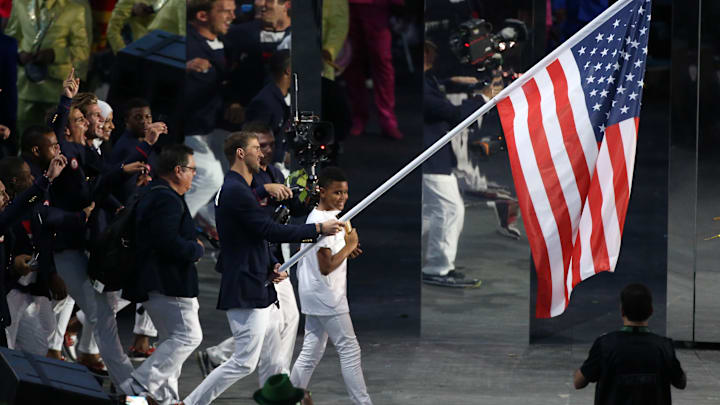For decades, Olympic spirit has come with an asterisk for the United States: we're the only country that refuses to dip its flag when passing the host country during the event’s opening ceremonies.
Traditionally, every nation’s team parades into the opening ceremonies venue behind one member who holds the country’s flag. In the stands sit the governing officials of the host country. As the team marches past this section, the flag bearer lowers the flag as a sign of respect. Every country does the dip, except for the United States. The small move of respect has been a thorn in the sides of host countries since the U.S. first snubbed the tradition at the 1908 London Games.
The story goes that the 1908 U.S. flag bearer, shotputter Ralph Rose, kept the flag erect as an act of nationalism and proclaimed, “This flag dips to no earthly king.” However, according to Penn State professor Mark Dyreson, that story may not be exactly true. In 2012, Dyreson—who studies the Olympics—told the Los Angeles Times that America's refusal to participate in the flag-dipping tradition is a bit more complicated.
Rather than being a matter of good old American pride, Dyreson said that the Irish-American athlete’s actions were more about disdain for the British. In that era, Irish athletes riled at competing under the Union Jack. And there's no hard evidence the “no earthly king” quip was ever muttered.
Until 1936, the practice to dip or not to dip flip-flopped. King Gustav V received a dipped flag in the 1912 Games in Stockholm, but 1936 was an easy call: The U.S. nearly didn’t participate in the Summer Olympics in Berlin, let alone dip a flag in respect to Adolf Hitler. The decision to not dip was announced beforehand, and the U.S. was joined in protest by Bulgaria, Iceland, and India, according to contemporary media reports. The move wasn't even the athlete's decision—it was a top-down call from the United States Olympic Committee and, as traditions often begin, it just stuck. (In the 1940s, the tradition was formalized in the U.S. Code, which reads, “the flag should not be dipped to any person or thing.”)
So when we don't dip our flag, it's not necessarily arrogance. It’s just a tradition that originated with a big middle finger to Hitler.
Find More Answers to Your Summer Olympics Questions:
A version of this story was published in 2018; it has been updated for 2024.
